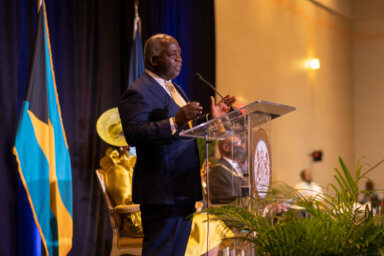DITCH THE BRITISH MOVE

The growing movement by Caribbean Community nations to ditch the British monarchy, become republics and dispose of colonial era symbols of imperialist oppression took a new turn this week when The Bahamas unceremoniously removed a statue of Christopher Columbus and dumped it aback of the works ministry’s compound until a final decision is made as to where it should reside, lie or be disposed of.
For decades, the huge bronze statue had been prominently displayed in government house but authorities appeared to have bowed to growing pressure in a major first step to remove colonial vestiges of oppression and have removed it from public view.
The announcement by government spokesman Latrae Rahming at the weekend comes just weeks after Prime Minister Phillip Davis said that he is all for the mini archipelago becoming a republic like Guyana, Trinidad, Dominica and Barbados but citizens would have to decide for the country to make the constitutional leap, not government.
“The only challenge with us moving to a republic is that I can’t, as much as I would wish to do it, I cannot do it without your consent. I will have a referendum and the Bahamian people will have to say to me, yes,” he told reporters a few weeks ago.
As for the Columbus monument, authorities appeared to have taken advantage of a recent defacement of it by a citizen of seemingly unsound mind. The 37-year-old man who broke one of the legs with a sledgehammer was heard to have yelled that “You destroyed this land. I’ve come to take this [expletive] back.”
“I can confirm that the statue has been removed,” local media quoted the government spokesman as saying. “It was an organised effort by government house, the Ministry of Works, and The Bahamas Antiquities Monuments and Museums Corporation. The statue will be stored at the ministry until the government and stakeholders determine its future usage.”
The announcement comes as debate rages in a number of regional member states as to what exactly governments must do with colonial era statues and other monuments celebrating trans Atlantic slave traders and supporters. Trinidad, Jamaica and Antigua are among those where calls are loudest.
The latest rounds of debates had coincided and appeared to have been sparked by the murder of black American George Floyd after a white police officer had kneeled on his neck for nearly 10 minutes in the US.
Two years ago this month, Barbados removed the imposing bronze statue of British Admiral Lord Nelson from the main and most prominent square in the capital, Bridgetown as it was preparing to ditch Britain’s now late Queen Elizabeth as its head of state, appoint its own local president and become a republic.
Nelson, famed for his successes in high seas battles with fellow European powers like Spain and France, was a staunch defender of the slave trade, a trait that has angered black activists who have for decades called for its removal alongside other local heroes as it was a vestige and relic of a horrid colonial past. The monument was erected way back in 1813. Many locals say it was offensive to them.
In Trinidad, the African Emancipation Committee has been leading calls for similar action in the twin-island federation with Tobago. Successive administrations have pledged to take action but no firm decision has been made as yet even as Columbus’s statue in downtown Port of Spain, the capital, has been defaced several times.
Activists across the region have also called for the renaming of streets, state buildings, schools and other facilities which are stark reminders of the colonial era.
In Barbados which will this month celebrate its first year as a republic, there is a spirited debate in the legal fraternity as to whether most senior attorneys should now switch to being referred from queen’s to king’s counsel now that King Charles has replaced his late mother as the British monarch. In other neighboring republics, these are simply referred to as senior counsel.
The issue came up in a local appeals court recently with several senior attorneys like Garth Patterson indicating that switching to king’s counsel rather than senior counsel would be a national and regional embarrassment as the island nation has severed such ties with Britain and the United Kingdom.
“Having a new monarch who does not represent the head of state of Barbados for us to adopt the postnominal of king’s counsel. I think it puts us in an embarrassing position. I think it sends the wrong message that despite our proclamation that we have cut our ties with the monarchy, we are still clinging to the vestiges of that monarchy. I personally have a serious difficulty in adopting that postnominal,” the Today online publication quoted Patterson as saying.



